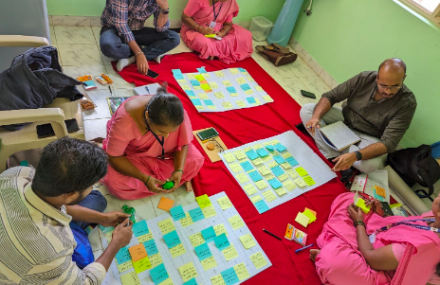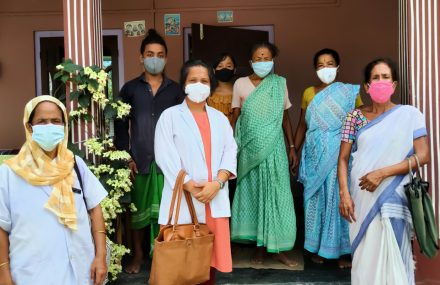Billions of dollars have been invested in the past decade in developing digital tools for advancing clinical and public health with limited success. Misalignment of incentives across public health administrators, hospital leadership, payers, clinicians, patients and others, as well as poor needs finding, and limited attention to sound design principles, have all resulted in digital tools not reaching their full potential, despite staggering advances in natural language processing, machine learning, and cloud computing.
We work with technology companies, governments, and academic institutions to advance digital health implementation science in resource-constrained settings. Our successful initiatives include cloud based disease surveillance systems at the world’s largest mass gatherings, evaluation of the world’s largest NCD screening and management program, digital health innovation labs, and policy outputs that have helped shaped India’s digital health architecture.
Projects

Digital Health Needs Finding Study
This study investigates the digital needs of Indian health systems, uncovering innovation opportunities and identifying gaps between stakeholder needs and current needs-finding processes.
Employing generative design research methodology, we delve into participants’ deeper awareness, aiding in articulating their unexpressed or inexpressible aspirations.

India Digital Health Net
The Digital Health Net hosted at the Harvard Mittal Institute is a consortium of technology companies, scientists, lawyers and policy makers from the US and India, shaping India’ digital health ecosystem design and implementation.

Non-Communicable Disease Software Solution Optimization
The India Digital Health Network (IDHN), in collaboration with researchers from St. John’s Research Institute, is optimizing the NCD software solution to contribute to the rigorous, methodical, evidence base for new digital health interventions. The study is quasi-experimental and is testing and validating interventions to optimize the national rollout of the NCD platform.

Kumbh Mela Disease Surveillance System
In 2013, Harvard University sent a research team of faculty and students with backgrounds in theology, urban planning, public health, and business to study the world’s largest mass gathering — the Kumbh Mela — and its impact on healthcare systems.

Innovation Labs
In collaboration with the Government of Karnataka and the St John’s Research Institute, our team has developed 10 digital health innovation labs – sites for the department of health to test and validate digital health tools before scaling them. The Innovation Labs are poised for expansion to additional sites in Karnataka and elsewhere.
Publications
Healthcare Professionals Registry
August 3, 2021
Abijeet V Waghmare, Akhil Malhotra, Angshuman Sarkar, Bharat Kalidindi, Dhinagaran D, Ryan Fernandez, Satchit Balsari, Sehj Kashyap, Tony Raj, Verghese Thomas
On June 22, 2021, the National Digital Health Mission (NDHM) and National Health Authority (NHA) of India released a consultation paper on its proposed Professionals Registry, a vital public good building block of the national digital health ecosystem. IDHN recommended that enrollment be required in phased manner; the registries be tiered; verifications be time-bound, distributed and prioritized; scope of the registries be significantly broadened.
Healthcare Facilities Registry
August 3, 2021
Abijeet V Waghmare, Akhil Malhotra, Angshuman Sarkar, Bharat Kalidindi, Dhinagaran D, Ryan Fernandez, Satchit Balsari, Sehj Kashyap, Tony Raj, Verghese Thomas
On June 22, 2021, the National Digital Health Mission (NDHM) and National Health Authority (NHA) of India released a consultation paper on its proposed Facilities Registry, a critical building block of the national digital health ecosystem under development. In response to request for public comment, the India Digital Health Network (IDHN) at Harvard’s Lakshmi Mittal South Asia Institute submitted a response drafted through a collaboration of domain experts from India and the US.
Responses to the Government of India’s Joint Parliamentary Committee’s Consultation on the Personal Data Protection Bill
February 1, 2020
Abhijeet Wagmare, Adrian Gropper, Angshuman Sarkar, AV Sethuraman, Clay Heaton, Geetika Sethi, Guriqbal Sngh Jaiya, Harpreet Singh, Jimmy Anthony, Nivedita Saksena, Rahul Matthan, Satchit Balsari, Shrey Desai, Sneha Vaidhyam, Supten Sarbadhikari, Tarun Khanna, Tony Raj
The IDHN team submitted comments to a Joint Committee of the India Parliament on the 2019 Personal Data Protection Bill, which aims to protect the personal data of individuals throughout India. In our comments we highlighted the implications of this law for health data and academic research being undertaken in the country.
Response To The Invitation For Public Comment National Digital Health Blueprint
August 4, 2019
Abhijit Gupta, Abijeet Waghmare, Adrian Gropper, Angshuman Sarkar, A V Sethuraman, Devesh Varma, Dhruv Pandey, Harpreet Singh, Jimmy Antony, John Halamka, Namrata Arora, Nivedita Saksena, Rahul Matthan, Satchit Balsari, Sneha Vaidhyam, Sunita Nadhamuni, Supten Sarbadhikari, Tarun Khanna, Tony Raj, Vivek Divan
In comments submitted to the Ministry of Health and Family Welfare in 2019 on its proposed National Digital Health Blueprint (NDHB), we recommended the adoption of Regulatory Sandboxes. These are controlled testing environments within which existing regulations may be temporarily relaxed to allow experimentation for novel technologies. They provide the enabling conditions that administrators need in order to test new solutions in subsets of populations in a responsible, controlled, and monitored real-world environment, before mandating change at scale. In August 2020, the National Health Authority announced the “NDHM Sandbox,” allowing integration and validation of third-party software by partnering with NDHM APIs.
Responses To The White Paper Of The Committee Of Experts On Data Protection Framework For India: A Lens On Health Data
February 1, 2018
Abhijit Gupta, Abijeet Waghmare, Adrian Gropper, Angshuman Sarkar, A V Sethuraman, Devesh Varma, Dhruv Pandey, Harpreet Singh, Jimmy Antony, John Halamka, Namrata Arora, Nivedita Saksena, Rahul Matthan, Satchit Balsari, Sneha Vaidhyam, Sunita Nadhamuni, Supten Sarbadhikari, Tarun Khanna, Tony Raj, Vivek Divan
On November 27 2017, in response to the white paper published by the Committee of Experts on Data Protection Framework for India, we recommended that data protection law encompass health data protection; systems that ensure privacy by design will fare better than systems based on consent and notice; data portability be interpreted as portability of structured health data; anonymization and aggregation over de-identification for securing data; and fiduciary responsibility of data controllers to the individual.